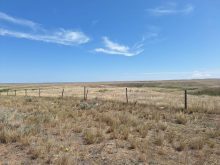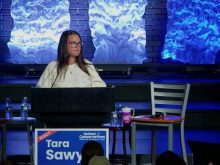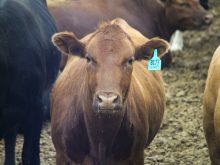For horse enthusiasts, it’s easy to get caught up in the lifestyle dream of acreage ownership. For the uninitiated, there are key considerations to keep in mind to prevent your dream from becoming a nightmare.
“The most important thing to keep in mind when you’re buying an acreage for horses is that your buying decision should be about the property,” explains realtor Robin Burwash of Maxwell City Central Town and Country in Black Diamond. “You can always change the home, you can always change the barn or the outbuildings, but you can’t change the land.”
Read Also

Farming Smarter receives financial boost from Alberta government for potato research
Farming Smarter near Lethbridge got a boost to its research equipment, thanks to the Alberta government’s increase in funding for research associations.
Robin, who grew up with horses and spent some time on the rodeo circuit – including a stint as rodeo and chuckwagon manager with the Calgary Stampede – parlayed his horsemanship into a career in real estate five years ago and has been using his personal horsemanship experience to help others make wise decisions when buying and selling rural properties. He says acreage ownership for people currently boarding their horses rurally while living in town themselves can be more accessible than they might initially realize.
Brian Chornawka, providing real estate services with Royal LePage Foothills and specializing in acreage properties for 31 years, “out of the same office, from the same desk, with the same company,” agrees. “Right now, we have the best supply ever.”
Brian explains that with inventories in rural properties at high supply, interest rates at notable lows and acreage prices at competitive levels, buyers interested in suitable properties for horse keeping are at a distinct historical advantage.
“For a reasonable property, with a reasonable home, and reasonable horse-suitability, you can access horse-ready properties for $750,000 to $875,000,” he says.
Robin adds, “People who have been paying to board their horses and paying for a home in town, could find that when they really look at the math, with the favourable interest rates and buying conditions on acreages right now, they can actually afford their own rural property for the same money per month.”
This seems to be the consensus Alberta-wide. Buyers with some flexibility in their locale can expand their options even more, the further away from one of the major centres they’re willing to go. Even a 20 minute additional commute can make a significant price – and inventory selection – difference.
Still, what horse owners need to keep top of mind are the basics: food and water. “If you don’t have water, you don’t have anything,” says Robin.
Municipal Districts bylaw how many animals can be kept on how much land. For instance, in the MD of Foothills, “you have to have three acres in order to have a horse on there,” explains Robin. “So, don’t buy 2.9 acres, don’t buy 2.99 acres: you’re not allowed to have any horses on your property if you’re under three acres.”
Yet, while the bylaw says that three acres can accommodate one to three horses, both Brian and Robin warn prudence in considering the real impact of land management and feeding for horses.
“The MD says you can have three horses on three acres, but it’s not practical,” advises Robin. “People can get pretty inventive with pasture rotation, but realistically on the bylaw minimum, you’re going to have to feed your horse all year round because three acres simply isn’t enough to feed even a single horse.”
“And,” warns Brian, “Once you lose hold of a manageable limit, once you’ve let your horses eat a grassland right down to bare dirt, you have to remove your horses and have them gone from the pasture for two years to seed and root a sustainable new grassland. Proper pasture management is really important.”
Living on an acreage with your horses should be about pleasure … not without work, to be sure, but enjoying your life with horses needs to be managed advisedly. If you’re new to rural living, leaning on the expertise of experienced realtors can be as key to a successful transition as is leaning on the expertise of experienced equestrian service professionals for the care and maintenance of your horses.
“We help you do your homework,” says Robin. “That’s my job as a realtor, to make sure you have good quality water, to make sure you find the right location for what your interests are.”
Proximity to trails and agricultural society arenas, access to an equestrian veterinarian and farrier, all need to be added to the list of considerations along with the topography of the property itself and the quantity and quality of water on it.
Robin says, “You want people to buy and enjoy their horse, not become overwhelmed or lose interest with the management of their rural properties.”
Happily, both Brian and Robin agree, most people who transition to acreage living with their horses never look back. .














